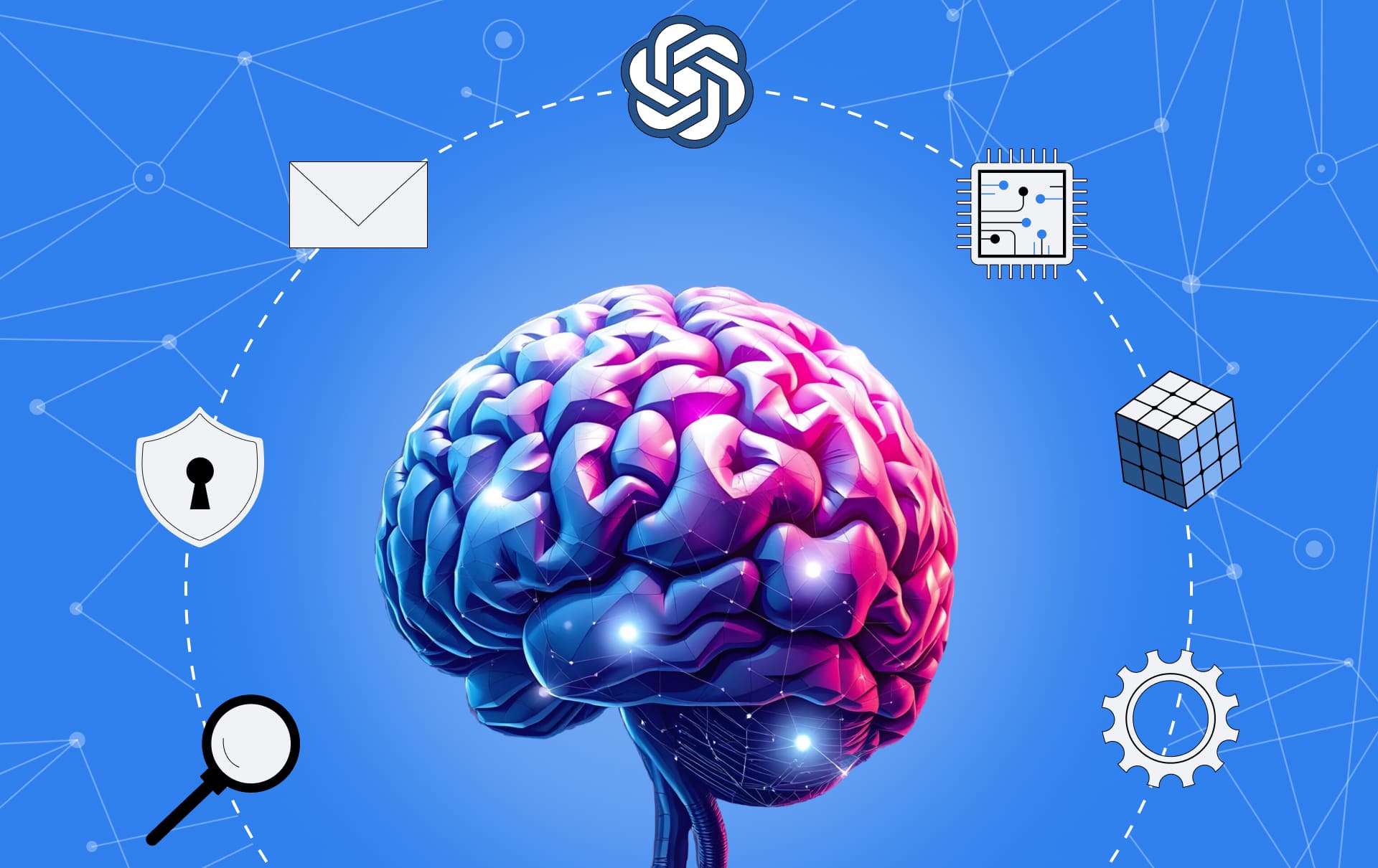In an increasingly competitive and complex business environment, businesses are looking for innovative technology solutions to optimize operations and improve efficiency. One area that is witnessing a dramatic change is accounts payable (AP) and accounts receivable (AR) management, with the emergence of artificial intelligence (AI)-based automation systems. These systems are not just support tools, but also digital partners that have the potential to transform the way businesses manage their finances.
So what are AI Agents? How to apply AI Agents in AP – AR management? Let's find out with Bizzi.
What are AI Agents?
AI Agents, also known as AI agents, are artificial intelligence systems designed to perform specific tasks autonomously and intelligently. They are capable of:
- Automate tasks: AI Agents can automatically perform repetitive tasks, freeing humans from mundane tasks.
- Decision Making: Based on established data and rules, AI Agents can make decisions independently.
- Learning and Adapting: AI Agents have the ability to learn from new data and adjust their behavior to improve performance.
- Interaction and collaboration: AI Agents can work together to complete complex tasks.
In finance, AI Agents are often designed to solve specific problems such as invoice management, payment processing, and cash flow forecasting. They can integrate with other systems such as CRM and ERP to create a seamless workflow.

Applications of AI Agents in Finance
AI Agents are revolutionizing many aspects of finance operations, especially in accounts payable (AP) and accounts receivable (AR) management. Specifically:
- Accounts Payable (AP) Management:
- Automate Invoice Processing: AI Agents can automatically extract data from invoices, match them to purchase orders and related documents, and send invoices to the right approvers. This reduces errors caused by manual data entry, saving time and effort.
- Payment scheduling: AI Agents can schedule payments to suppliers based on the company's existing payment terms and cash flow.
- Fraud Detection: AI Agents can analyze transactions to detect unusual or suspicious activity, helping to prevent fraud and incorrect payments.
- Improve Supplier Relationships: By ensuring timely payments, AI Agents help maintain good relationships with suppliers.
- Accounts Receivable (AR) Management:
- Create and send invoices automatically: AI Agents can automatically create invoices for customers based on established rules.
- Send payment reminders: AI Agents can send automatic payment reminders to customers when invoices are due or overdue, helping to collect debts faster.
- Payment reconciliation: AI Agents can reconcile payments from customers with corresponding invoices, detecting underpayments or overpayments.
- Cash flow forecasting: AI Agents can analyze historical data and predict future cash flows, helping companies make smarter financial decisions.
Comparison of traditional AP/AR management and AI
Traditional and AI-powered accounts payable (AP) and accounts receivable (AR) management have significant differences in how they work, how they perform, and how much they cost. Here’s a detailed comparison:
Traditional account management:
- Data entry and verification: Manual, time consuming and error prone.
- Payment reminders: Mostly manual tracking, slow response, no predictability.
- Invoice reconciliation: Manual, time-consuming process.
- Error rate: High due to manual processing.
- Cash flow forecasting: Based on historical data and manual adjustments, less accurate.
- Fraud Detection: Based on basic rules.
- Scalability: Difficult to scale due to manual process.
- Cost Effective: High administrative costs due to manual tasks.
- Processing time: Slow, time consuming.
- Personnel requirements: Requires a lot of manpower to perform repetitive tasks.
- Adaptability: Difficulty adapting to new invoice formats or changes in processes.
- Information limitations: Data is often fragmented, making it difficult to make decisions.
AI Account Management:
- Data entry and verification: Automate, use technologies like OCR, NLP to extract data from invoices, minimizing errors.
- Payment reminders: Predictive alerts based on patterns and due dates, more proactive.
- Invoice Reconciliation: Automatically reconcile invoices with purchase orders, reducing time and effort.
- Error Rate: Reduced through machine learning and automation.
- Cash Flow Forecasting: AI-Based Predictive Model, More Accurate.
- Fraud Detection: Anomaly Detection and Fraud Prevention with AI.
- Scalability: Easily scalable with automation and AI.
- Cost-effective: Lower operating costs due to automation.
- Processing time: Much faster, can process invoices in seconds.
- Staffing requirements: Reduce staffing requirements, allowing employees to focus on more strategic work.
- Adaptability: Ability to learn and adapt to new invoice formats.
- Provide information: Provide real-time insights into cash flow, spending patterns, and supplier relationships.
- High Volume Processing Capability: Capable of processing thousands of invoices continuously without backlog.
- Accuracy: Guaranteed accuracy close to 100%.
- Integration: Easily integrates with ERP systems and accounting software.
Summary comparison table:
| Feature | Traditional management | AI Management |
| Enter and verify data | Handmade | Automatic |
| Payment reminder | Reaction, manual | Predictive, automatic |
| Compare invoices | Manual, time consuming | Automatic, fast |
| Error rate | High | Short |
| Cash flow forecast | History-based, manual adjustments | AI models, more accurate |
| Fraud Detection | Basic Rules | AI, anomaly detection |
| Scalability | Difficult | Easy |
| Cost effective | High | Short |
| Processing time | Slow | Quick |
| Personnel requirements | Much | Less |
| Adaptability | Short | High |
| Provide information | Limit | Details, real-time |
| High volume processing | Challenges | Easy |
| Accuracy | Short | Almost 100% |
| Integration | Difficult | Easy |
Managing accounts payable and receivable with AI offers many benefits over traditional methods. AI helps automate repetitive tasks, reduce errors, speed up processing, provide insights, and improve decision-making.
The shift to AI-powered account management not only saves businesses money and time, but also creates a competitive advantage in an increasingly complex business environment. Businesses that adopt this technology early will be able to operate with greater financial accuracy and speed, outperforming their competitors.
How AI Automated AP/AR Management System Works
The AI-powered AP/AR management system operates on the coordination of AI agents, designed to automate routine tasks, improve accuracy, and optimize cash flow. Specifically, the system works as follows:
- Data Collection and Processing: AI agents collect invoice data and payment details from various sources such as emails, documents, or directly from the supplier’s system. Technologies such as OCR (Optical Character Recognition) and NLP (Natural Language Processing) are used to extract data from both digital and hard copy invoices. This eliminates manual data entry, reduces errors, and saves time.
- Verify and Reconcile: AI agents match invoices to purchase orders and contracts to ensure accuracy before payment. At the same time, customer payments are matched to outstanding invoices, and any discrepancies are flagged for further review. This process minimizes errors and fraud, ensuring only accurate invoices are approved.
- Payment Scheduling and Collections: The system automatically schedules payments to suppliers based on due dates, payment terms, and available cash flow. For receivables, AI will track unpaid invoices and send automatic reminders to customers, improving cash flow and minimizing the risk of delinquency.
- Cash Flow Optimization and Forecasting: AI agents balance incoming and outgoing payments to maintain a steady cash flow. Based on historical data, AI can forecast cash flow in real time, helping businesses proactively deal with potential liquidity issues.
- Operations Orchestrator: The Master Orchestrator Agent acts as a central controller, coordinating the operations of all other AI agents to ensure the system runs smoothly and efficiently.
- Learning and Improving: The system uses machine learning to continuously learn from new data, improving accuracy and decision-making. AI is able to adapt to new invoice formats and company-specific characteristics.
- System Integration: AI-powered AP and AR management systems are capable of seamless integration with existing ERP systems and accounting software. This helps create a unified financial ecosystem and ensures that data is exchanged smoothly between systems.

Benefits of AI-Based Automated AP/AR Management System
Deploying an automated AP/AR management system using AI brings many significant benefits to businesses:
- Process Automation: AI automates repetitive tasks like data entry, invoice reconciliation, payment processing, and invoice sorting. AI agents can collect data from multiple sources, reducing manual effort, allowing employees to focus on more strategic activities. By some estimates, AI can automate up to 80% of AP and AR tasks.
- Increased Efficiency: AI speeds up invoice and payment processing, reducing the time required for financial processes. The system can process invoices in seconds and increase operational efficiency by up to 30%. This not only saves businesses time but also improves cash flow.
- Error Reduction: With machine learning and automation, AI reduces human errors, increasing the accuracy of financial data. AI-powered validation processes can reduce errors by up to 25%, ensuring trustworthy financial data.
- Improve Cash Flow: AI helps manage payments and collections more efficiently, optimizing cash flow. AI can predict potential liquidity issues and schedule payments based on cash flow, helping businesses better plan their finances. AI systems can also send automatic payment reminders to customers and suppliers, minimizing late payments.
- Accurate Forecasting: AI models can analyze historical data and provide more accurate cash flow forecasts, helping businesses make informed financial decisions.
- Fraud Detection: AI can analyze transaction patterns to detect unusual or suspicious activities, such as duplicate invoices or invalid payments, helping to protect business assets.
- Scalability: AI account management systems easily scale as workload increases, without the need for additional staff.
- Providing Insights: AI provides real-time insights into cash flow, spending patterns, and supplier relationships, helping businesses make data-driven decisions.
- System Integration: AI systems can seamlessly integrate with existing ERP systems and accounting software, creating a unified financial ecosystem and ensuring data flows smoothly between systems.
- Cost Savings: By automating manual tasks and minimizing errors, AI helps reduce operational costs and increase profits.
- Enhanced Competitiveness: Businesses that apply AI in financial management can achieve higher levels of accuracy and speed, thereby gaining a competitive advantage over their competitors.
Applications of AI in Industries
AI-based automated AP/AR management systems are being widely applied in many different industries, including:
- Manufacturing: AI helps automate invoice processing, data reconciliation, and cash flow management, helping factories optimize processes and reduce costs.
- Retail: AI can sync with inventory management systems to optimize cash flow, make data-driven purchasing decisions, and detect fraud.
- Finance: Financial institutions can use AI to automate accounting processes, analyze financial data, and make more accurate forecasts.
Challenges and Prospects
Despite the many benefits, implementing an AI-based AP/AR management system also faces some challenges, such as data diversity, system integration, and security issues. However, with the continuous development of technology, these challenges are gradually being solved. In the future, AI will continue to play an important role in transforming financial operations, bringing efficiency, accuracy, and transparency to businesses.
Conclude
Automated accounts payable/receivable systems powered by AI are not just a tool, but a breakthrough in financial management. By automating processes, reducing errors, improving cash flow, and providing insights, AI is helping businesses become more efficient, save costs, and increase competitiveness. Businesses that invest in this technology will have a huge advantage in an increasingly complex and volatile business landscape.
Monitor Bizzi To quickly receive the latest information:
- Facebook: https://www.facebook.com/bizzivietnam
- Linkedin: https://www.linkedin.com/company/bizzi-vietnam
- Youtube: https://www.youtube.com/@bizzivietnam

